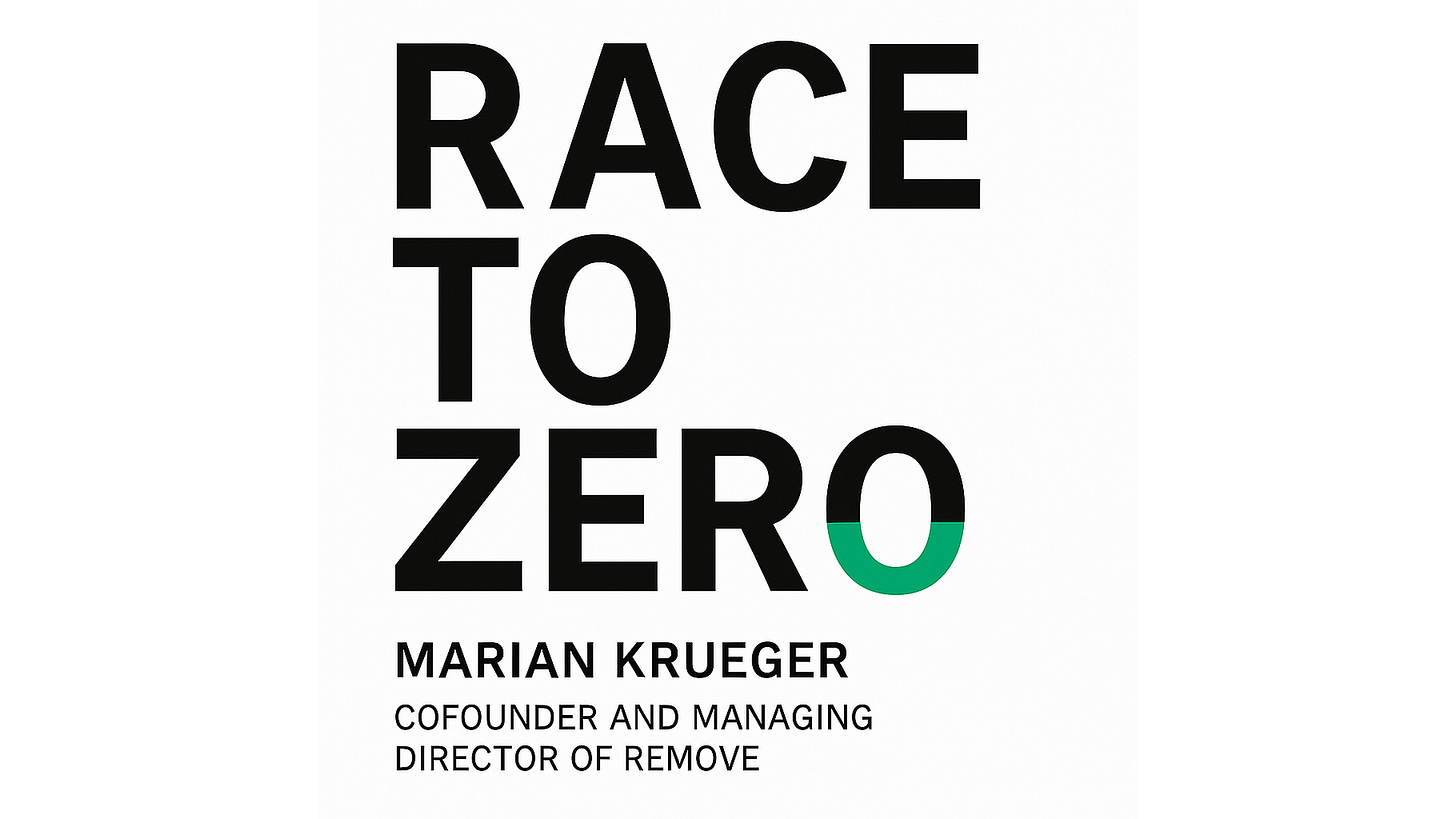Carbon Removal's Ecological Succession: Entrepreneurs From Zero-to-One to One-to-Two
A wide-ranging conversation with Marian Krueger on climate ambition, industry evolution, and the future of carbon removal.
Quick Takeaways
(Short on time? Start here.)
1. Beginner's mind wins. Even seasoned experts benefit from revisiting the basics. As I say in the show, returning to first principles helps break out of stale thinking. Marian Krueger, too, rereads his own work to reconnect with foundational truths.
2. Carbon removal moves fast—books can't keep up. Krueger noted that startups mentioned in his book have already folded. That doesn't invalidate the work—it underscores how dynamic the field is, and how important it is to separate timeless insights from startup noise.
3. You won't make money from writing a book. Publishing a niche book about a niche topic in German? Definitely not a path to riches. But it can open doors, signal credibility, and offer policymakers or sustainability leads an entry point into the conversation.
4. Why carbon removal? Because we need it. The space is weird and difficult. It's more uncertain than ever. And yet, as Krueger says, "we need it—and we need a heck of a lot of it."
5. Global South is key. Remove is focusing more on India and Sub-Saharan Africa. The appeal isn't carbon metrics, it's local benefits: crop yields, jobs, clean air. Krueger argues these narratives are essential for meaningful, just deployment.
6. Forget vertical. Go horizontal. Instead of doing everything, companies like Residual and Offstream are focusing on project development and enablement. Carbon removal is maturing.
7. The next wave? Maybe not CDR at all. Short-lived pollutants. SRM. Ocean iron fertilization. As we face climate overshoot, many in CDR are revisiting the fringes. Disillusionment isn't failure; it's an invitation to expand our toolkit.
Carbon Removal as Ecological Succession: From Zero-to-One to One-to-Two
What happens when the pioneers of a movement realize they’re no longer the main characters in the story? In carbon removal, that moment might already be here.
Marian Krueger, co-founder of remove and co-author of one of the first books on carbon removal for a general audience, joined me (Ross Kenyon) on the Reversing Climate Change podcast to reflect on how far the space has come—and where it might go next.
From Books to Better Questions
Krueger is refreshingly honest: writing a book about carbon removal was never about building a personal brand or making money. It was about helping more people understand why this space matters. And it did just that. The book found its way into corporate offsites and even German parliamentary meetings. Whether politicians or their aides read it cover to cover is beside the point. The book became a door-opener.
Still, the book is already dated. Some startups featured have folded. But Krueger says that’s okay: the goal was to surface enduring ideas, not forecast the winners.
Why Are We Still Here?
"Because we need it," Krueger says simply. Carbon removal may be messy and expensive and misunderstood. But there's no viable climate solution without it. That urgency keeps him going.
I agree—and add that CDR offers something else: conceptual elegance. Emissions went up. What if we could take them down? That tidy logic drew many people into the field.
But as they both admit, tidy logic doesn't survive contact with the real world. Measurement, permanence, additionality—these questions are hard. And the more you learn, the more complex they become.
Enter: The Second Cohort
Remove has now supported 160 startups. The early ones were often academic or idealistic, focused on solving problems regardless of whether they had a viable business. In later years, more seasoned entrepreneurs joined the field, bringing lessons from SaaS, marketplaces, or consumer tech.
Krueger sees this as a healthy evolution. Carbon removal is starting to act like a real industry. Some companies are going horizontal—focusing on project development (Residual) or developer services (Offstream) instead of doing everything. The market can now support specialization.
A Global Story, Not a Western One
One of Remove's biggest shifts? Geographic focus. Krueger and his team are expanding into India and Sub-Saharan Africa. But there, the message isn't about net-zero targets or parts per million.
In India, the value proposition is crop yield improvements, job creation, and reduced air pollution. In Africa, it's smallholder income and local capacity-building. Carbon removal is co-benefit-driven in these regions. And rightly so.
Reclaiming the Fringe
We end our conversation discussing the next frontier. If carbon removal no longer feels fringe, what does?
Solar radiation management. Methane mitigation. Ocean iron fertilization.
These used to be taboo. Now, they're becoming practical considerations (albeit controversial ones.) Krueger says it's healthy disillusionment. The models aren’t penciling out. The IPCC's timelines aren’t holding. We may need all of the above.
The carbon removal world is returning to its geoengineering roots. Not because it wants to. Because it might have to.
Who Comes Next?
In ecology, succession is the natural progression of species in an ecosystem. First come the hardy pioneers. Then, over time, a more stable, diverse, and resilient system emerges.
That’s what Krueger hopes for carbon removal. That the current class of crazy, obsessed, overextended startup founders will one day hand the baton to people in suits with normal jobs. That it becomes a 9-to-5. That carbon removal becomes boring.
If that happens, he says, we’ve won.



